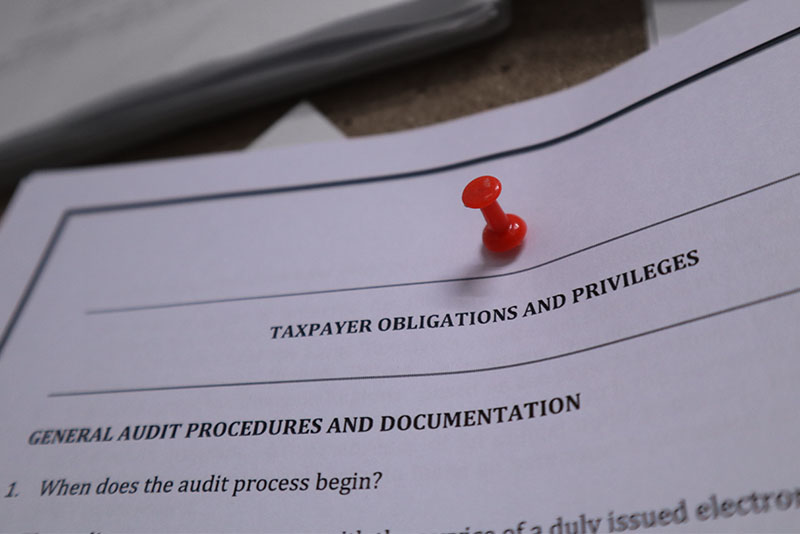Atty. Rodel C. Unciano discusses the changes made to streamline tax compliance requirements and other benefits taxpayers receive once the Ease of Paying Taxes Act is approved.

Ease of paying taxes under House Bill No. 8942
By Atty Rodel C. Unciano
"The bill likewise seeks to strengthen the taxpayer’s bill of rights, specifically the taxpayer’s right to pay no more than the correct amount of tax, right to a fair and just tax system, right to be informed with timely and easy to understand information, right to quality tax education and service, right to consistent and transparent application of laws, right to have the classification of taxpayer considered whenever tax rules are prepared and enforced, right to privacy and confidentiality of information, right to speedy disposition of tax investigation cases and other similar actions, and right to be protected against malicious, excessive and wrongful assessments, among others."
House Bill No. 8942 or the proposed Ease of Paying Taxes Act has recently been approved on third reading at the House of Representatives. This is certainly good news for all taxpayers as the bill aims to modernize tax administration and improve tax compliance by simplifying compliance procedures and strengthening the taxpayer’s bill of rights.
The bill seeks to establish reasonable criteria for classifying taxpayers, taking into consideration the taxpayer’s capacity to comply with tax rules and regulations, the amount and type of tax paid, the gross sales and/or receipts of the taxpayer, inflation, volume of business, wage and employment levels, and similar economic and financial factors. The Secretary of Finance shall provide a classification for large and medium taxpayers and introduce additional classifications of taxpayers as may be necessary and reasonable to achieve better service and tax administration.
 For every class of taxpayers, the Bureau of Internal Revenue (BIR) may provide for a special unit to specifically cater to the needs of taxpayers under such classification. This is in recognition of the varying ability of taxpayers to settle their tax obligations. For ease of compliance to tax rules and regulations, simplified tax returns and processes shall be implemented for taxpayers not classified as medium or large.
For every class of taxpayers, the Bureau of Internal Revenue (BIR) may provide for a special unit to specifically cater to the needs of taxpayers under such classification. This is in recognition of the varying ability of taxpayers to settle their tax obligations. For ease of compliance to tax rules and regulations, simplified tax returns and processes shall be implemented for taxpayers not classified as medium or large.
As to the registration requirements, the bill proposes to remove the requirement of indicating a business style in the taxpayer’s registration with the BIR. The bill likewise seeks to remove the imposition of the annual registration fee currently imposed under Section 236(B) of the Tax Code. Also, the bill seeks to ensure that registration facilities would be available to taxpayers who are not residing in the country.
As to the invoicing and accounting requirements for VAT-registered taxpayers, the bill seeks to unify the requirement for VAT documentation, requiring only a VAT invoice for every sale, barter or exchange of goods or properties, lease of goods or properties, and for every sale, barter or exchange of services. Under the bill, the requirement for the issuance of VAT official receipt for lease of goods or properties, and for sale, barter or exchange of services shall no longer be required.
The bill likewise seeks to strengthen the taxpayer’s bill of rights, specifically the taxpayer’s right to pay no more than the correct amount of tax, right to a fair and just tax system, right to be informed with timely and easy to understand information, right to quality tax education and service, right to consistent and transparent application of laws, right to have the classification of taxpayer considered whenever tax rules are prepared and enforced, right to privacy and confidentiality of information, right to speedy disposition of tax investigation cases and other similar actions, and right to be protected against malicious, excessive and wrongful assessments, among others.
To ensure that the rights of the taxpayers are protected, the bill seeks to establish a Taxpayer’s Advocate Office which shall be under the supervision and control of the Department of Finance and independent from the BIR. The Taxpayer’s Advocate Office shall identify systemic problems with the BIR which hampers efficient and fair tax administration and propose changes to mitigate identified problems.
Simplified procedures in paying taxes plus guaranteed taxpayer’s rights against undue tax assessments will certainly encourage taxpayers, small and medium taxpayers alike, to pay what is due to the government.
The author is a partner of Du-Baladad and Associates Law Offices (BDB Law), a member-firm of WTS Global.
The article is for general information only and is not intended, nor should be construed as a substitute for tax, legal or financial advice son any specific matter. Applicability of this article to any actual or particular tax or legal issue should be supported therefore by a professional study or advice. If you have any comments or questions concerning the article, you may e-mail the author at This email address is being protected from spambots. You need JavaScript enabled to view it. or call 8403-2001 local 140.



